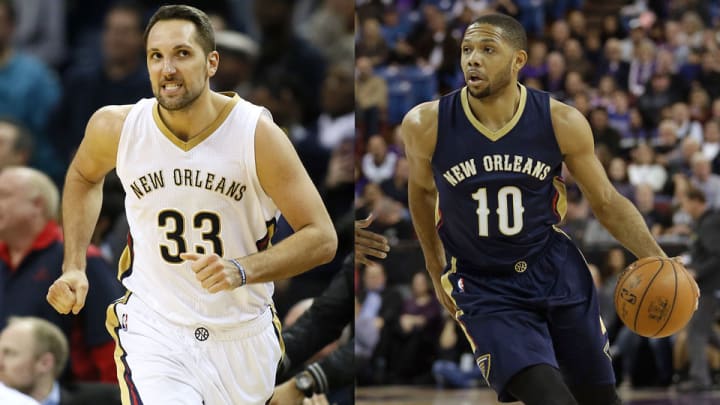Grades: Anderson and Gordon don't solve Rockets' defensive issues

For a team that dedicated a greater percentage of its offense to three-point attempts than any other in the league, the Houston Rockets had shockingly few consistent long-range options. That changes this summer with the additions of former Pelicans Ryan Anderson (four years, $80 million) and Eric Gordon (four years, $53 million)—quality options at long range that should give James Harden all the room he needs to operate. Their arrival fulfills the vision of a Mike D'Antoni team: a dominant driver and playmaker, a bouncy pick-and-roll big (up-and-comer Clint Capela), and support shooting across multiple positions. This is poised to be one of the most explosive scoring teams in the league.
Both, however, manage to complicate the defensive prospects of a team that ranked 21st in the league in points allowed per possession and let its best defensive player (Dwight Howard) walk in free agency. Capela has the potential to clean up some of the mess—his pairing with Anderson, in particular, makes a ton of sense for all involved—but shouldn't be expected to fully carry lineups with several problematic defenders involved. Harden's issues on that end are well documented. Anderson's, too, are real and rooted in iffy instincts and lacking lateral mobility. Gordon is more solid in relative terms but by no means a solution. Guarding effectively on the perimeter generally requires either quickness, length, or incredible precision. None are Gordon hallmarks—and that's when he's able to stay on the floor to begin with.
• Grading the biggest deals in free agency | NBA free agency tracker
In Anderson and Gordon, Houston also adds two quality players not exactly known for their physical durability. Gordon is especially snakebit; the 27-year-old shooting guard has played 65+ games just once in his eight-year career and has seen his game taxed by recurring injury. We have every reason to expect that Gordon will miss a third of the season (or more) in most cases. All Houston can really hope is that their latest investment is healthy when it matters—an endeavor they should be proactive in making a reality. Anderson's injury history is split between freak incidents and gradual wear. In total, a variety of ailments complicated the bulk of his stint in New Orleans.
Neither needs to play a full 82 for their signing to be a success—only live up to the prospect of what their games could add to a D'Antoni offense. Houston has looked to acquire or develop a forward as stretchy as Anderson for years. Gordon is at his best when playing alongside a full-time creator and running to the arc off the break. This could be a best-case landing spot for both players in terms of a marriage between style and skill, even while the imbalances of their respective games hold the Rockets from high-level contention. Consider it incremental change for a team very much in need of a refresh.
